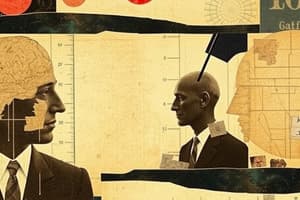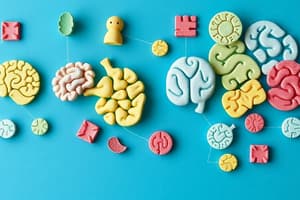Podcast
Questions and Answers
Which of the following is NOT one of the eight sets of abilities proposed by Howard Gardner?
Which of the following is NOT one of the eight sets of abilities proposed by Howard Gardner?
- Visual-spatial
- Interpersonal
- Technological (correct)
- Musical
What is the primary criticism of Gardner's theory of multiple intelligences?
What is the primary criticism of Gardner's theory of multiple intelligences?
- Too much emphasis on subjective judgment
- Inability to measure intelligence fairly
- Lack of empirical evidence (correct)
- Too many intelligences identified
What does Gardner believe about an individual's possession of multiple intelligences?
What does Gardner believe about an individual's possession of multiple intelligences?
- An individual may possess all forms of intelligence to some extent (correct)
- An individual's intelligence is predetermined and unchangeable
- An individual may possess all forms of intelligence equally
- An individual may only possess one form of intelligence
What is the traditional definition of intelligence criticized for according to defenders of MI theory?
What is the traditional definition of intelligence criticized for according to defenders of MI theory?
What is the main difference between Gardner's theory and traditional intelligence tests?
What is the main difference between Gardner's theory and traditional intelligence tests?
What is the relationship between Gardner's theory and learning styles?
What is the relationship between Gardner's theory and learning styles?
What is the primary way in which Gardner's theory has influenced education?
What is the primary way in which Gardner's theory has influenced education?
What is the main criticism of Gardner's theory according to psychometrics?
What is the main criticism of Gardner's theory according to psychometrics?
What is the main goal of Gardner's theory according to his own words?
What is the main goal of Gardner's theory according to his own words?
Flashcards
Multiple Intelligences Theory
Multiple Intelligences Theory
Intelligence is not a single general ability, but multiple specific ones.
Gardner's Eight Intelligences
Gardner's Eight Intelligences
Musical, visual-spatial, linguistic, logical-mathematical, bodily-kinesthetic, interpersonal, intrapersonal, and naturalistic.
Dominant Intelligence
Dominant Intelligence
Each person has all intelligences to some extent, but one is dominant.
Pluralized Teaching
Pluralized Teaching
Signup and view all the flashcards
Intelligence Modality Criteria
Intelligence Modality Criteria
Signup and view all the flashcards
Intelligence-Fair Measures
Intelligence-Fair Measures
Signup and view all the flashcards
Human Adaptation
Human Adaptation
Signup and view all the flashcards
Individualized teaching styles
Individualized teaching styles
Signup and view all the flashcards
Avoid Labeling Learners
Avoid Labeling Learners
Signup and view all the flashcards
Study Notes
Theory of Intelligence Proposed by Howard Gardner
-
The theory of multiple intelligences proposes that human intelligence can be differentiated into specific intelligences, rather than defining intelligence as a single, general ability.
-
The theory has been popular among educators for 40 years despite being criticized by mainstream psychology for its lack of empirical evidence and dependence on subjective judgment.
-
An intelligence modality must fulfill eight criteria, according to the theory.
-
Howard Gardner proposed eight sets of abilities that manifest multiple intelligences, including musical, visual-spatial, linguistic, logical-mathematical, bodily-kinesthetic, interpersonal, intrapersonal, and naturalistic.
-
Gardner believes that each individual may possess all of the various forms of intelligence to some extent, but that there is always a dominant, or primary, form.
-
The theory has shaped educational pedagogy and influenced relevant policy and legislation across the world.
-
Gardner opposes labeling learners to a specific intelligence and maintains that his theory should "empower learners," not restrict them to one modality of learning.
-
The theory has been criticized for its lack of empirical evidence and dependence on subjective judgment.
-
Intelligence tests and psychometrics have generally found high correlations between different aspects of intelligence, rather than the low correlations which Gardner's theory predicts.
-
The traditional definition of intelligence is too narrow, according to defenders of MI theory, and a broader definition accurately reflects the differing ways in which humans think and learn.
-
Some criticisms arise from the fact that Gardner has not provided a test of his multiple intelligences.
-
The theory and definitions have been critiqued as being so unclear as to be tautologous and thus unfalsifiable.Multiple Intelligences Theory
-
Human adaptation is due to general ability to falsify hypotheses and make accurate predictions.
-
IQ tests only measure linguistic and logical-mathematical abilities.
-
Gardner emphasizes the need for intelligence-fair measures to assess distinct modalities of thinking and learning.
-
Empirical evidence for non-g intelligences is either lacking or very poor.
-
Gardner's theory has not been accepted by most academics in intelligence or teaching.
-
Gardner's theory has been adopted by many schools, where it is often conflated with learning styles.
-
Gardner has denied that multiple intelligences are learning styles and recommends individualized teaching styles, pluralized teaching, and avoiding the term "styles."
Studying That Suits You
Use AI to generate personalized quizzes and flashcards to suit your learning preferences.




